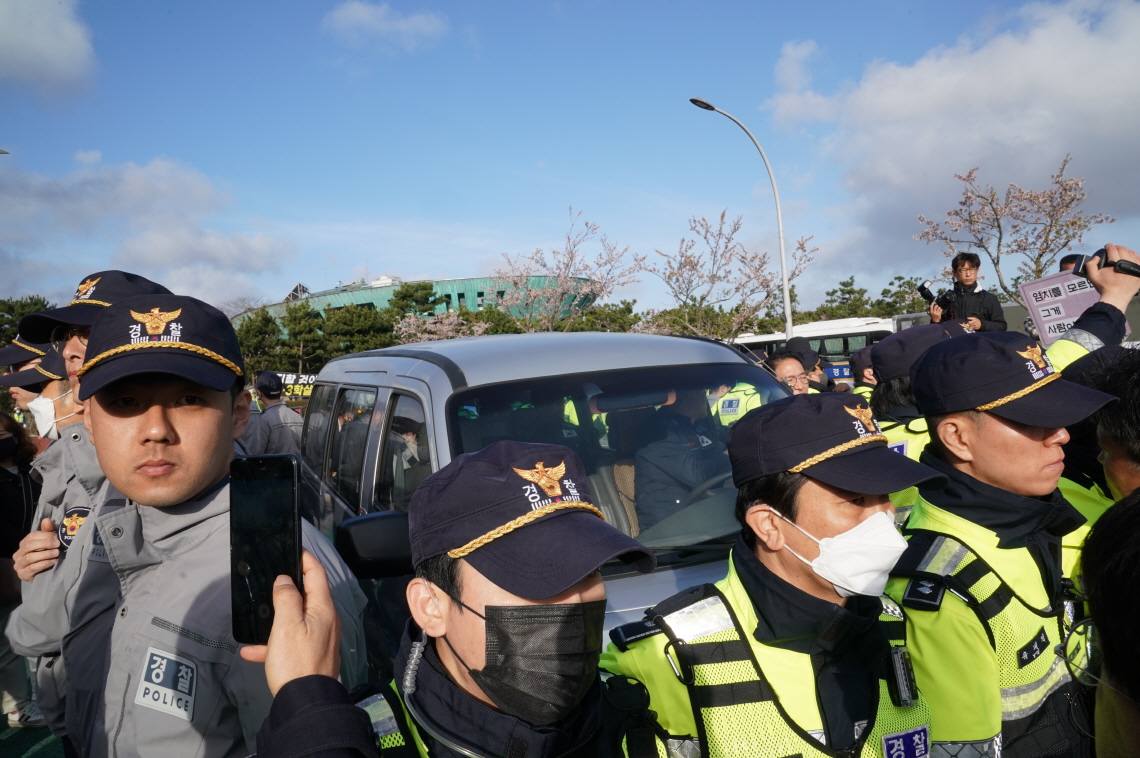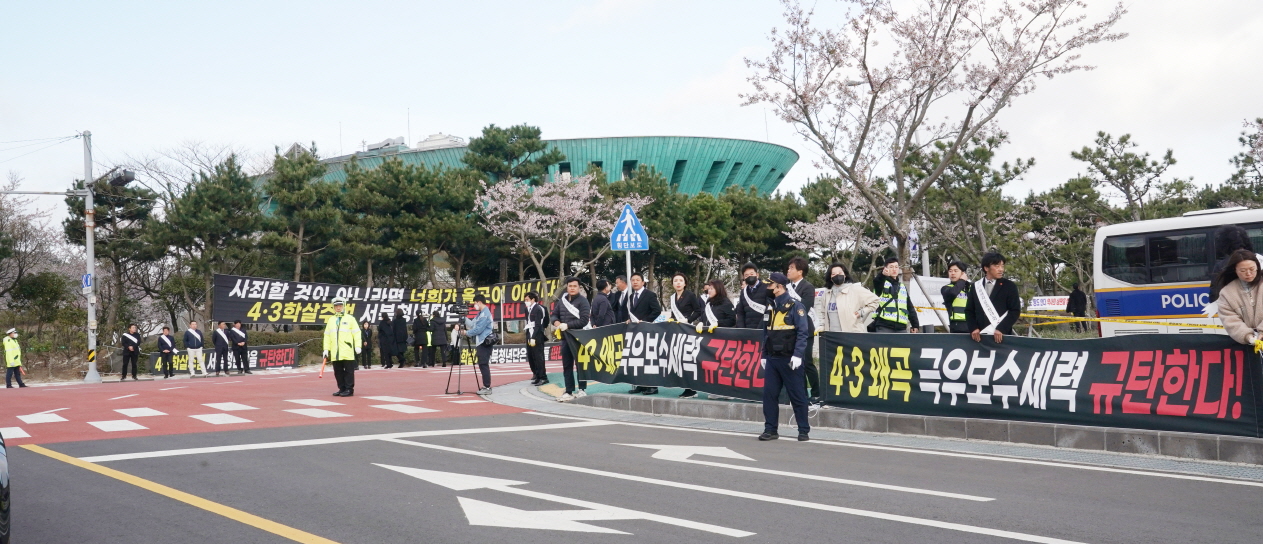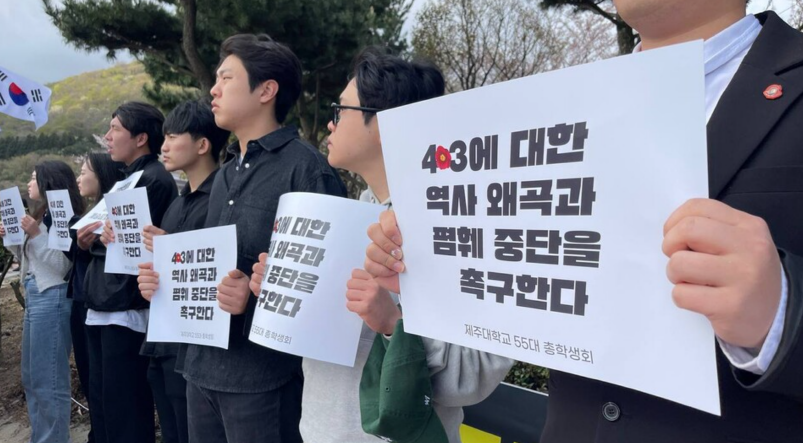Memorial Ceremony Observation for Jeju 4·3’s 75th Anniversary Season of avoidance, negligence and mockery
– Inside story of the memorial ceremony for the 75th anniversary of Jeju 4·3
Kim Dong-hyun, Literary Critic

++ The self-proclaimed band devoted to the reconstruction of the Northwest Youth League appears at the Jeju 4·3 Peace Park on the morning of April 3 when the memorial ceremony for the Jeju 4·3 victims was held. They claimed that the history of Jeju 4·3 had been distorted. The number of people who were to attend the rally as originally reported was 20, but only three people appeared in a van at the scene. Victims’ families and Jeju residents who visited the memorial ceremony immediately surrounded the vehicle and protested strongly, and the confrontation continued for a while. The far-rightists left without even getting out of the car. The bereaved families and Jeju residents expressed anger, saying, “Get out of the Jeju 4·3 Peace Park!” “How dare you come here in the name of the Northwest Youth League that massacred civilians at the time of Jeju 4·3?” “Is it to disturb others on the day of their ancestral rites?” and “The souls of the tens of thousands of victims must be enraged!”
Disdainful finger-pointing incurred by politics of disregard
The President did not attend the memorial ceremony. The ruling party leader used to pay a courtesy visit but did not show up this year. Prime Minister Han Duck-soo, who attended on behalf of the President, hurriedly flew back to Seoul after reading the President’s memorial speech.
That memorial speech was full of the language of high-tech industries and development, rather than that of mourners. All condolences by nature express belated regret; therefore, any language of mourning must inevitably contain remorse for the deceased. All that remorse might be the same as a kind of terrible self-blame. This is one of the reasons why the memorial service is held every year.
To speak in the way of Roland Barthes, you need to share your sorrow with others but not be hardened by remaining in your own grief. You shouldn’t be a monument for mourning alone.
It might be wrong to expect their utmost mourning in the rhetoric used by politicians. But there must be a minimum acceptance value in a psychological sense. Evidently, it was not the language of high-tech industries and development that was expected by those victims’ families and Jeju residents who visited the memorial site at the Jeju 4·3 Peace Park for the first time in three years due to COVID-19.
When the Prime Minister read the President’s speech, sharp lamentations were heard from among the audience. It was also heard around the venue that participants said to themselves, “This is disappointing.” In one corner of the press room, reporters were counting the number of syllable blocks in the conspicuously shortened memorial speech. It was 635. Of course, a lengthy speech is not all good. However, there was no room for even minimal mourning and remembrance within these 635 syllable blocks.
While South Korean politics disregarded mourning, mockery came into bloom like weeds. There was disdainful finger-pointing that was once believed to have expired. The Northwest Youth League, a group which assumes the title of the “successor” to the organization with the same name reminiscent of the atrocious massacres in Jeju, visited the island during the memorial ceremony. However, it was a foreseen visit. On the day of the memorial ceremony, the Youth Committee of the Association for the Bereaved Families of Jeju 4·3 Victims, the Jeju Headquarters of the Korean Confederation of Trade Unions, and other local civic groups in Jeju surrounded the road near the Jeju 4·3 Peace Park. It was where it had been reported that the outdoor assembly would be held by the Northwest Youth League members. Despite the media hype to amplify the issue, only three people appeared on the site. But not a single member would be allowed to enter the Jeju 4·3 Peace Park. The police were dispatched to prevent any possible clash, and confrontation between the civic groups and the far-rightists lasted for a while. The unwelcome guests were laughing as they filmed the whole scene with their cell phones. It was a mockery, an obvious mockery.
It was a moment when the slogan, “Jeju 4·3 is a part of Korean history,” was overshadowed. It was a scene where the minimum common sense built up by democracy in this land after the 1987 June Democratic Struggle was denied. It was a recoil that took place on the national memorial day to mock the achievements made, including the public apologies and official investigations by the state. The flag of mockery was still pinned on the site where only two years ago it was declared that the truth about Jeju 4·3 is an undeniable chapter for democracy in Korean history. There may be many other reasons behind the scene, but clearly, it was caused due to those irresponsible people in power.
While the President was crying out about liberal democracy, the seeds of contempt under the guise of freedom were budding. It is none other than clear negligence. It is not about knowing what is shame and what is courtesy. If the nation’s principles of democracy and the spirit of the Constitution were properly understood in South Korea, that misdeed by even a handful of ill-intentioned people could not have been disregarded. It was a bud of instigation that grew while a Supreme Council member of the ruling party praised a pastor who calls Jeju 4·3 a “communist riot act” and flattered himself as being the guardian of liberal democracy. As long as the politics feeding on that instigation continue, the bud will likely keep growing. It should have been weeded out. Separation from it should have been declared earlier.
Nevertheless, it is clear why this instigation continues. This is because there are still forces who look at Jeju 4·3 with ideologically prejudiced eyes. And so it became clear. The memorial ceremony marking the 75th anniversary of Jeju 4·3 proved that there is an obvious reason to discuss Jeju 4·3 once again.
Despite its remarkable achievements, the enactment of the Jeju 4·3 Special Act in 2000 was an outcome of political compromise.
And, the general revision of the Jeju 4·3 Special Act in 2021 was an achievement with an unfinished task. We shouldn’t have been satisfied with it. We should have asked more intense questions. We should have refused to accept a compromise that eventually left some issues as unrevisitable topics.

++ The outside of the Jeju 4·3 Peace Park, where the memorial ceremony was held, is plastered with banners hung by bereaved families and civic groups to prevent the so-called advocates for the reconstruction of the Northwest Youth League from rallying.
Toward a new movement refusing to accept unrevisitable topics
You own your own words. Words that the speaker fails to take responsibility for are nothing but a representation of hypocrisy. It was repeatedly said that the truth about Jeju 4·3 would be revealed. It was a remark made by the President of the Republic of Korea, not anybody else. With the revision of the Jeju 4·3 Special Act, compensation for the victims has begun. There has been a move to have the documentary heritage about Jeju 4·3 be inscribed on the UNESCO Memory of the World register. Despite all these efforts, however, the language of politics is still empty. The argument made by the ruling party’s Supreme Council member concerning the importance of the memorial ceremony cannot be regarded as a personal mistake. The product of compromise, which still defines Jeju 4·3 as a “massacre of innocent civilians,” has nourished mockery and contempt.
This is why we need to ask questions. Is the President’s attendance a standard for mourning and remembrance? What would be mourning in a true sense? Who should be mourned, and what should be remembered? As former President Moon Jae-in said during his visit to the 73rd anniversary ceremony, are we calling the names of those who were killed “for opposing national division in the dream of complete independence”? Now that the reality of division remains and there are a considerable number of those who applaud the reaction of history, should we neglect the forced silence once again? As the memorial ceremony approaches every year, many call for the President to attend it. It may be natural to ask for the President’s attendance because April 3 is a national memorial day. However, the President’s attendance should not be a standard for mourning. In a sense, the perplexing landscape faced by the 75th anniversary memorial ceremony may signal to us that we need a new attitude towards remembrance and mourning.
Death is a universal event in that one’s life is to end with his or her death. However, a death has specific causes.
The confrontation between those specific causes is another battle of life and a battlefield for remembering time. We now stand on a battlefield. This is not a physical fight. It is a confrontation with a reaction that denies the sheer legitimacy of it in order to maintain memories. It is also a huge relapse. It is those who instigate the reaction who are the servants of anti-democracy and anti-human rights protection.
But we are well aware. Reaction always comes wearing a mask of good faith. When the target of the massacres is defined as “civilians,” if not “innocent civilians,” the memory of resistance against state violence will undergo something like taxidermy and be neglected.
Negligence and avoidance cannot overturn the reaction. Even at the moment I am writing this article, a politician named Tae Yong-ho still asks what he should apologize for. Some politicians take his side, saying, “We can’t openly punish others for what they think.” I am not saying that we need to punish their thoughts. We need to punish the irresponsibility of expressing these thoughts. Where should we be headed at a time when the far-right group, the self-proclaimed advocate of the reconstruction of the Northwest Youth League that interfered with the memorial ceremony, is pressing charges against the bereaved families with the law as their weapon? What should be the mourning for Jeju 4·3 in a true sense?
Chinese author Lu Xun said that crazy dogs should be beaten with a club. Didn’t we let go of the club that we should have grabbed, when we were instead intoxicated by the achievement of April 3 becoming a national memorial day? Didn’t we neglect the memory of the fight, avoid the fight, and forget the names we are supposed to call out clearly?
In the face of the continued attempts to distort and defame Jeju 4·3 whenever a conservative regime is established, we need to grab the club again. Rather than relying on the good will of the state, we need to use the club to beat the state that is about to turn evil. Tolstoy said, “The state is a violent institution.” Indeed, the state is a violent institution.
Now our Jeju 4·3 needs to establish itself as another movement to refuse to accept unrevisitable topics. It should be Jeju 4·3 as a verb, not as a noun. This is why we have to discuss Jeju 4·3 and live to befit Jeju 4·3.
 ++ Students from Jeju National University’s student union are picketing.
++ Students from Jeju National University’s student union are picketing.